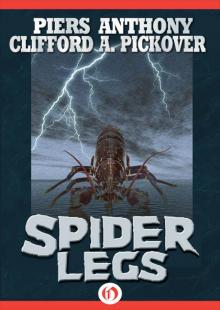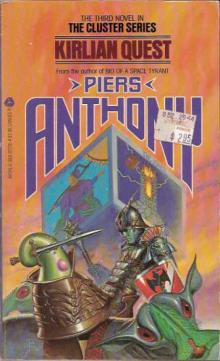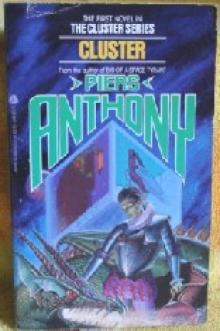- Home
- Piers Anthony
Executive Page 5
Executive Read online
Page 5
“Hope, we have Hopie on the line,” Spirit said.
“Put her on!”
Hopie’s face appeared. “Oh, isn’t he cute!” she exclaimed.
“Uh, I need—” I began somewhat lamely.
“Yes, Daddy, Aunt Spirit explained. You’re all upheavaled! You need a bottle, and a formula, and a crib, and some toys and a whole lot of time.”
“I don’t have any of those!”
“I know. I’d better get up there and take over.”
“But your mother—”
“Daddy, she understands.”
“I’m not sure she does.”
Spirit touched my hand. “She understands.”
Evidently Spirit had talked directly to Megan. “Oh. Then—”
“I’ll catch a priority flight,” Hopie said happily.
“The Navy will take you, dear,” Spirit put in. “Can you be ready in ...” She glanced at Shelia.
Emerald’s face flicked on the screen. “Fifteen minutes,” she said, and flicked off.
“Yes,” Hopie agreed.
“You’ll be here in two hours,” Spirit told the girl.
“He’ll wake before then, hungry,” Hopie said. “Give him something to chew on.”
“We’ll try,” I said.
“And change your shirt,” Hopie instructed me.
I glanced down at myself. Yes, I needed a change. I started to work my way out of the shirt.
The screen blanked. “Now we’d better make the announcement about the abolition of Congress and assure the citizens that their interests will be represented,” Spirit said briskly.
“But Robertico—”
“We’ll put some pillows on the floor; he’ll be safe there.”
They fetched pillows from the nearest beds elsewhere in the mansion and piled them on the floor. I set the baby down, but the moment I let go of him, he woke and screamed, and I had to pick him up again.
In addition, I discovered that I had no replacement shirt. In our rush to get here and get started, that detail had been neglected. “I will order more,” Shelia said. She knew my sizes, of course; she knew everything about me that a secretary should know, and more.
So I sat in a plush easy chair, shirtless, holding Robertico, with pillows braced about me. He settled back to sleep, and Spirit and I made notes for my next announcement.
“Sir,” Shelia said.
I was coming to dread that word! “Not another crisis?”
“The Saturn Embassy,” she said.
I sighed. “Put it on.”
The face of the ambassador from Saturn came on the main screen. He took in my situation and scowled. “Perhaps I should return when you are less domestic, Mr. President,” he said.
“Just call me Tyrant,” I said. “What is your business?”
“My government wishes to clarify the status of interplanetary relations between Jupiter and Saturn, considering your recent change in government.”
“Unchanged,” I said.
“We would prefer an improvement.”
“I’m amenable.”
He seemed disconcerted. “Specifically—”
“No specifics yet,” I cut in. “If you come to us with positive proposals for the diminution of interplanetary tension, we shall reciprocate. It’s up to you.”
Still, he seemed unpleased. He was trying to measure me, and I wasn’t giving him much substance. “Surely—”
“So good to have had this dialogue,” I said, signaling to Shelia, who cut him off.
“We’ll have trouble with Saturn,” Spirit said darkly. “They always work over a new administration.”
“Precisely,” I agreed. “I mean to be ready for the vultures as they descend.”
We returned to work on the announcement, punctuated by calls from every type of party. I dealt with them as well as I could, making no commitments. We formulated a list of prospects for service in the new administration; Spirit had largely prepared that beforehand and needed only my concurrence. It was complicated because there were so many necessary offices and so many people; matching the two together was a headache. We knew we had to get at least a patchwork government organized promptly, so that anarchy would not erupt.
Suddenly Hopie was there, lifting the sleeping baby from my shoulder; I had hardly been aware of the passage of that time. My daughter did know her business; she set up shop in a corner of the room (because Robertico felt comfortable with me but not apart from me) and saw to a feeding and another change of diaper. Coral brought in another shirt for me; evidently Shelia’s order had arrived.
We continued, calling the people on our list, asking their participation, accepting their excuses, stressing that there was no coercion here: we wanted only those who would be committed to the welfare of Jupiter without reservation. Some were belligerent and some were afraid, but when they learned that it truly was voluntary, a number of these softened and did accept the positions. Some who turned down the offer later called back with a change of heart, and we accepted them. Slowly but satisfyingly the new framework was being erected.
I don’t pretend that this was any genius of mine. Spirit had done the groundwork and now prompted me on the execution. I was like a duffer who assembles a complex device by following the simplistic step-by-step instructions provided. I was the figurehead to Spirit’s strategy. That was nothing new; my genius is reading (and making an impression on) other people, while Spirit’s is organizational. We have always been a team, and there is no shame in that. While it is true that I would be a sorry figure of a politician without Spirit, it is also true that she would be unable to perform without me.
Then Coral approached me. “Sir, it is time for you to rest,” she said firmly.
“But there is so much to do!” I protested.
“You have been working without pause for ten hours,” she informed me. “The others are dead on their feet, but they will not stop until you do.”
I glanced around and saw that it was true. Spirit was drawn, and Shelia’s eyes were red-rimmed. Hopie was asleep on the pillows with Robertico. Still, I demurred. “Just a little more work, and the list will be complete.”
“That list will never be complete,” she asserted. “I am charged with the preservation of your body, and that charge I shall honor, preserving it from all threats—including that of your will. You must rest now, at least for a while.” She took my arm and drew me firmly along.
The others did not protest, and I suffered myself to be conducted to the master bedroom. “Strip, wash, change,” Coral ordered, and I obeyed. It did not bother me that she watched; she had seen me in dishabille many times before, for she was always close. Once there had been a trap set for me in a urinal, so now she accompanied me to the bathroom too. One might suppose that a man would be nervous about having an attractive woman with him on such an occasion, but Coral was really part of my nuclear family.
In pajamas, I lay down on the huge empty bed, now feeling my own fatigue. Then another thought occurred. I sat up. “I just remembered another appointment to—”
“Down, sir,” Coral said.
“But it will only take a moment to—”
She moved to me, put her arms about me, and bore me down on the bed. She had changed herself, to some kind of feminine robe that I know concealed some unfeminine hardware; Coral was never without armament, ready for any emergency. She put what is called the scarf-hold on me, her right arm circling my neck, and, gripping my right shoulder, her left hand hauling on my right sleeve, her legs spread and braced against the surface of the bed. I think I could have broken that hold, had I wished to make sufficient effort, for my strength was greater than hers, but I wasn’t sure, and in any event, it wasn’t worth the effort. So I lay there, conscious of her right breast nudging my cheek as she breathed and of the sight of her left breast through the parted robe, and I relaxed.
When she saw that I was willing to rest, she released her hold and kissed me. Then she stretched out beside me on the
bed and slept herself, lightly and instantly, like a cat. It is intended as no affront to Coral that I wished she was Megan; the separation from my wife remained fresh and painful but final; when Megan had consented to unite with me, that had been final, and when she sundered that union, for reasons that were certainly sufficient, that, too, was final. It was I who had changed, not her; I had passed from the stage of Politician to the stage of Tyrant, and she had never consented to be married to the latter. I understood, respected her decision fully, and did not question it, but still there was a void without her.
My tension alerted Coral, who woke. “Damn it, sir, sleep!” she whispered. She changed position, took hold of my head, and drew it in to her bosom. It was a fine and fragrant bosom, but I think it was more the feeling of her arms around me, holding me close, that brought my submission. Helse had held me that way, so long ago, and Roulette, too, less long ago, and Shelia, recently. I relaxed, comforted, and suddenly slept.
CHAPTER 4
BETWEEN CT AND BH
I woke many hours later, somewhat refreshed. Coral was up, of course; she had always had a fast recharge time.
We assembled for breakfast—I’m not sure what the hour actually was, but we treated it as morning—at the White Bubble dining room, served by the WB staff. Spirit, Coral, Shelia, Ebony, Hopie, and Robertico. I don’t remember what we ate; my attention has been increasingly absorbed by concerns other than food as I grow older, so I tend not to notice meals, anyway, unless they are for some reason remarkable in their own right.
I deliberately kept the conversation on trivial matters. I would soon enough be overwhelmed by the consequential ones. “Hopie, we’ll have to arrange for your education,” I said.
She made a wry face. “I’m fifteen years old. Most of what they teach in school is useless, anyway. I’d be better off without it.”
The others ate, remaining carefully neutral. They knew I supported education.
“I had in mind bringing in a competent tutor,” I said. “Surely she would teach you useful material.”
“But the required courses are jokes!” she protested. “Even the best teachers can’t make a pointless course worthwhile.”
I frowned. “What course is pointless?”
She hesitated, realizing that she could walk into a mire of her own making. Teenagers can be imperious, but they are not, despite some appearances, total fools. “What courses did you take, Daddy, once you were my age?”
That set me back, for my formal schooling had abruptly stopped at that age. That had been by no choice of mine, however. “I had some lessons from life,” I said. “I would have preferred those of school.”
“So you had no more school—and where are you now?” she demanded triumphantly.
“But I did have further education,” I pointed out. “I took many courses in the Navy—more than I would have in normal school. I learned a great deal.”
“But those were military classes. At least they had some application to life.”
“Many were,” I agreed. “But many were necessary to fill out the education I had not gained from school.”
She changed her tack. “Well, did they teach you geometry?”
“Certainly. In space, maneuvers are three-dimensional, and a proper understanding is essential to—”
“Plane geometry,” she said with disdain. “How to solve triangles by erecting perpendiculars with a compass and straightedge. You did that?”
“Well, no, not exactly. We used the computer simulations to do the underlying calculations and projections, but—”
“We must do it by hand,” she said witheringly. “Two years of it. We’ve had computers for ten centuries, but they won’t let us use them!”
“Six centuries,” I said. “But it is necessary to know the fundamentals, in order to appreciate what the computers do.”
“Seven. Does it take two years of ever-more-obscure two-dimensional examples to appreciate what the computers do in three-dimensional space?”
Spirit turned away, masking half a smile. I was in trouble! “I suppose the basics could be abridged,” I said. “Perhaps one semester, and then the computer applications for the more advanced work.”
“Exactly!” she said triumphantly. “I’ve already had three semesters of it, and none of it about computer applications. Why should I continue?”
“Name another useless subject,” I said.
“English.”
“Now I realize you are bilingual, as are a number of Hispanics,” I said, “but English is the primary language of Jupiter, and it behooves those of us who have adopted this planet to—”
“Verbs and nouns,” she said. “The same things, every year, over and over.”
“Well, again it is necessary to know the basics before—”
“No it isn’t,” she said. “I learned to speak English and Spanish before I ever heard of the parts of speech. Everyone else did too. It is no more necessary to know the names of the parts of speech in order to use the language correctly than it is to know the names of the muscles and ligaments of the body in order to live and breathe.”
I sat back, considering that. She had a point! “But surely those who were brought up in less literate homes than your own require this form of education, so that—”
“No they don’t!” she said hotly. “They need to be instructed in the correct forms directly. The parts of speech are merely a means to an end, and the educational system has let the means become the end! They’re trying to turn out illiterate students who can name the parts of speech!”
“Surely you exaggerate!” I said, daunted. Where had I been warned before about means becoming ends? “The basics remain useful as underlying knowledge, much as the knowledge of the basic principles of mathematics remains useful in the computer age. Speaking correctly is not necessarily a simple—”
“Define a gerund,” she said.
I concentrated. I remembered the term but had forgotten to what it applied. “An animal like a hamster?”
“Gerbil,” she said, correcting me in the manner I had corrected her about the period of computers but refusing to be distracted by the humor. Now Shelia turned away, smiling. “It’s strange that you cannot define a gerund, Daddy, since you just used one.”
“I did? Where?”
“A gerund is a verb used as a noun, ending in ‘ing.’ You said ‘speaking,’ and that’s a gerund.”
Now I remembered. “I guess I did, daughter.”
She closed in for the kill. “You knew how to use it before you learned the name of that part of speech in school, and you knew how to use it after you had forgotten its name. Of what use is the name of it to you?”
I spread my hands. “No use that I can fathom at the moment, Hopie.”
“Would two more years of instruction in gerunds and participles and indirect objects and dependent clauses and parallel structure improve your ability to speak?”
I laughed, as much at her vehemence as at her point. “I suspect not.”
“Then why foist off this useless drill on me? It won’t improve my speech, either.”
Indeed, it would not, for she had been speaking to me most effectively. I was privately proud of her ability to make her point. She was a bright girl who reminded me a lot of Spirit, and I was always pleased to be reminded of that.
“What would you have me do, Hopie?” I asked. “Abolish school?”
She considered. “No. School could be useful—should be useful, if correctly instituted. What you need to do is make the schools relevant.”
“And you know what reforms contemporary education requires to make it relevant?”
“I know where to start,” she said.
“Well, start there.”
Her eyes widened. “What?”
“I think that’s an incomplete sentence.”
“What are you telling me, Daddy? That I don’t have to take those stupid courses anymore?”
I glanced at Spirit. “The Department of Edu
cation remains unassigned?”
“Unassigned,” she agreed. “We got tired last night.”
I returned to Hopie. “You are now in charge of the Department of Education. Do your job.”
“My job?” she asked, dumbfounded.
“Reform education.”
“But I’m only fifteen!”
“So?”
“That’s too young to—”
“By whose definition?”
“But the minimum age—”
“The old order changeth. This is the Tyrant speaking. You are old enough.”
“But—but—I really wouldn’t know how to—I mean, who would even listen to me?”
“The school system,” I said. “Of course, you will want a staff to advise you and implement policy. I suggest that you select it carefully. Perhaps some of the really good teachers you know.”
“You mean—honest? Me?”
“Honest, honey. I think the experience will be as good an education for you as the conventional system would have provided. Just keep in mind that many other people will be profoundly affected by your decisions.”
“Um,” she agreed, daunted.
Breakfast broke up, and we got to work. Hopie saw to Robertico’s needs—she was certainly good in that capacity—while she assimilated the magnitude of the responsibility I had laid on her. Spirit and Shelia and I adjourned to the conference room.
“First you will want to look at these,” Spirit told me, showing a sheaf of papers.
“What are they?”
“Your daily news summary. It’s a normal presidential service. The top man has to be kept informed.”
“You have gone over these, of course?”
“Of course.”
“Just acquaint me with what I need to know to function.”
“Saturn is making a move,” she said.
I sighed. “That’s to be expected, isn’t it? They always work over a new president.”
“Always,” she agreed. “But this is not a normal presidential transition, and so this may not be a normal Saturnist move.”
“Exactly what is it?”
“They are shipping troops to Ganymede.”
I frowned. “That’s their prerogative, isn’t it? It is a Saturnian puppet-state.”

 Serial
Serial Question Quest
Question Quest Chthon
Chthon Dragon on a Pedestal
Dragon on a Pedestal E. S. P. Worm
E. S. P. Worm Hope of Earth
Hope of Earth The Series Boxed Set
The Series Boxed Set Blue Adept
Blue Adept The Sopaths
The Sopaths Beetle Juice
Beetle Juice Awares
Awares Golem in the Gears
Golem in the Gears Geis of the Gargoyle
Geis of the Gargoyle Bamboo Bloodbath and Ninja's Revenge
Bamboo Bloodbath and Ninja's Revenge Heaven Cent
Heaven Cent Neq the Sword
Neq the Sword Pandora Park
Pandora Park Juxtaposition
Juxtaposition Bearing an Hourglass
Bearing an Hourglass Dragon Assassin
Dragon Assassin Board Stiff
Board Stiff Virtual Mode
Virtual Mode Castle Roogna
Castle Roogna Aliena Too
Aliena Too Pet Peeve
Pet Peeve The Metal Maiden Collection
The Metal Maiden Collection Volk
Volk Phaze Doubt
Phaze Doubt The Color of Her Panties
The Color of Her Panties Amazon Slaughter and Curse of the Ninja Piers Anthony
Amazon Slaughter and Curse of the Ninja Piers Anthony The Worm Returns
The Worm Returns Zombie Lover
Zombie Lover Xone of Contention
Xone of Contention The Gutbucket Quest
The Gutbucket Quest Split Infinity
Split Infinity Dream a Little Dream: A Tale of Myth and Moonshine
Dream a Little Dream: A Tale of Myth and Moonshine Balook
Balook Out of Phaze
Out of Phaze The Secret of Spring
The Secret of Spring Mouvar's Magic
Mouvar's Magic Cube Route
Cube Route Mercenary
Mercenary Total Recall
Total Recall Man From Mundania
Man From Mundania The Magic Fart
The Magic Fart Letters to Jenny
Letters to Jenny Jack and the Giants
Jack and the Giants Executive
Executive Robot Adept
Robot Adept On A Pale Horse
On A Pale Horse Vale of the Vole
Vale of the Vole Crewel Lye
Crewel Lye For Love of Evil
For Love of Evil Spider Legs
Spider Legs Mute
Mute Being a Green Mother
Being a Green Mother Hair Suite
Hair Suite Air Apparent
Air Apparent Politician
Politician Aliena
Aliena Phthor
Phthor Ghost Writer in the Sky
Ghost Writer in the Sky Pornucopia
Pornucopia Eroma
Eroma Shepherd
Shepherd Kirlian Quest
Kirlian Quest Swell Foop
Swell Foop God of Tarot
God of Tarot If I Pay Thee Not in Gold
If I Pay Thee Not in Gold Amazon Expedient
Amazon Expedient Faun & Games
Faun & Games Vision of Tarot
Vision of Tarot Centaur Aisle
Centaur Aisle Serpent's Silver
Serpent's Silver Cluster
Cluster With a Tangled Skein
With a Tangled Skein Chaining the Lady
Chaining the Lady Wielding a Red Sword
Wielding a Red Sword Key to Chroma
Key to Chroma WereWoman
WereWoman Isis Orb
Isis Orb Hair Peace
Hair Peace Two to the Fifth
Two to the Fifth Viscous Circle
Viscous Circle Skeleton Key
Skeleton Key Cautionary Tales
Cautionary Tales The Source of Magic
The Source of Magic Unicorn Point
Unicorn Point Writer's Retweet
Writer's Retweet Demons Don't Dream
Demons Don't Dream Ogre, Ogre
Ogre, Ogre The Iron Maiden
The Iron Maiden Tortoise Reform
Tortoise Reform Luck of the Draw
Luck of the Draw A Spell for Chameleon
A Spell for Chameleon Yon Ill Wind
Yon Ill Wind Currant Events
Currant Events Var the Stick
Var the Stick And Eternity
And Eternity Kiai! & Mistress of Death
Kiai! & Mistress of Death Chimaera's Copper
Chimaera's Copper Refugee
Refugee Isle of View
Isle of View Thousandstar
Thousandstar Mer-Cycle
Mer-Cycle Service Goat
Service Goat Five Portraits
Five Portraits Night Mare
Night Mare Steppe
Steppe Lavabull
Lavabull Well-Tempered Clavicle
Well-Tempered Clavicle Aladdin Relighted
Aladdin Relighted Aladdin and the Flying Dutchman
Aladdin and the Flying Dutchman Knot Gneiss
Knot Gneiss Roc and a Hard Place
Roc and a Hard Place Aladdin Sins Bad
Aladdin Sins Bad Flytrap
Flytrap Prostho Plus
Prostho Plus Esrever Doom
Esrever Doom Hair Power
Hair Power The Journey
The Journey Virtue Inverted
Virtue Inverted Of Man and Manta Omnibus
Of Man and Manta Omnibus Trail Mix: Amoeba
Trail Mix: Amoeba Noah's Brick
Noah's Brick Odd Exam
Odd Exam Magenta Salvation
Magenta Salvation Jest Right
Jest Right Fire Sail
Fire Sail Chthon a-1
Chthon a-1 Amoeba
Amoeba Juxtaposition aa-3
Juxtaposition aa-3 Pira
Pira THE CATERPILLARS QUESTION
THE CATERPILLARS QUESTION What Fears Become: An Anthology from The Horror Zine
What Fears Become: An Anthology from The Horror Zine Bio of a Space Tyrant Vol. 3. Politician
Bio of a Space Tyrant Vol. 3. Politician Ogre Ogre x-5
Ogre Ogre x-5 Rings of Ice
Rings of Ice On a Pale Horse ioi-1
On a Pale Horse ioi-1 Luck of the Draw (Xanth)
Luck of the Draw (Xanth) Centaur Aisle x-4
Centaur Aisle x-4 Thousandstar (#4 of the Cluster series)
Thousandstar (#4 of the Cluster series) Gutbucket Quest
Gutbucket Quest Isle of Woman (Geodyssey)
Isle of Woman (Geodyssey) Chaining the Lady c-2
Chaining the Lady c-2 To Be a Woman
To Be a Woman Cluster c-1
Cluster c-1 Battle Circle 2 - Var the Stick
Battle Circle 2 - Var the Stick Mercenary (Bio of a Space Tyrant Book 2)
Mercenary (Bio of a Space Tyrant Book 2) Battle Circle 1 - Sos the Rope
Battle Circle 1 - Sos the Rope Xanth 30 - Stork Naked
Xanth 30 - Stork Naked Secret of Spring
Secret of Spring Xanth 29 - Pet Peeve
Xanth 29 - Pet Peeve Serpents's Silver
Serpents's Silver Statesman by Piers Anthony
Statesman by Piers Anthony Out of Phaze aa-4
Out of Phaze aa-4 Amazon Slaughter & Curse of the Ninja
Amazon Slaughter & Curse of the Ninja